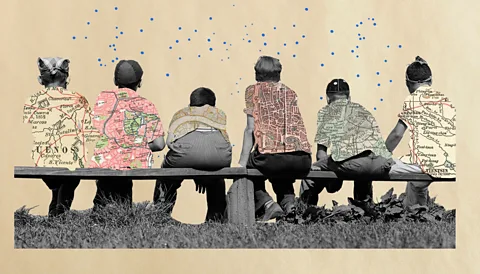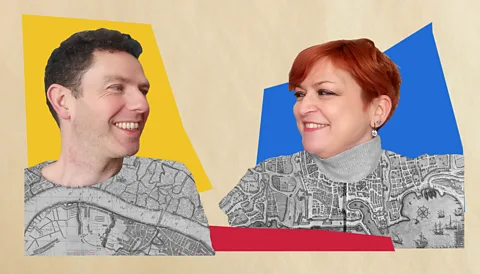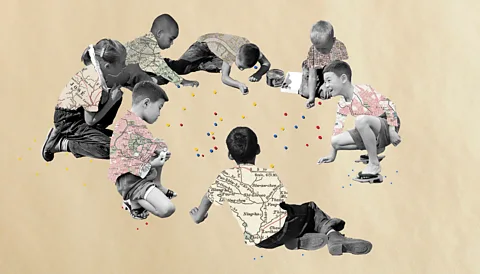'I call her my Italian sister': The power of cross-cultural friendships
 Javier Hirschfeld/ BBC
Javier Hirschfeld/ BBCWhat happens when we make friends across borders? Two writers talk about their British-Italian friendship – and the fascinating cognitive science on such cross-cultural bonds.
David Robson, London: Aristotle famously described friendship as having "one soul dwelling in two bodies", but what are the challenges of stretching that bond across countries?
Having explored the psychology of social connection in my most recent book, I find that my conversations with my own acquaintances can become rather meta – in the sense that I now often talk to my friends about friendship. I was particularly interested to hear the thoughts of my Italian "sister" Alessia Franco, who lives in Palermo in Sicily, on the joys of befriending someone from another country.
Although certain psychological barriers can make it harder to establish a rapport with someone from a different background, the research suggests that these cross-cultural and cross-linguistic connections also bring some unique benefits – a fact that we have experienced in our own friendship.
As friends and frequent co-writers, it seemed natural to put our (metaphorical) pens to paper and explore the topic in depth. I'll leave it to Alessia to start.
Alessia Franco, Palermo: Across one's professional life, a journalist encounters hundreds of people. The number clearly depends on the type of work one does, whether we feel the need to be present for every story, all the time, or whether we wish to alternate between moments of observation and moments of introspection. But we rarely expect to form a lasting connection with the people we encounter.
I first met David in one of Sardinia's remotest villages to record a series of short films exploring the forces behind its residents' extraordinary longevity. David was the host, and I was the producer. We had every reason to believe that, after our job was done, we would each return to our individual lives in London and Sicily without any further contact.
 Javier Hirschfeld/ BBC
Javier Hirschfeld/ BBCOne of the first things I appreciated was David's willingness to "take one for the team". I am teetotal, and yet the Sardinians that we met had the habit of offering us their homemade wine as if it were coffee. To refuse would have been bad manners, but David was always ready to help me finish my glass without our hosts noticing.
This secret complicity was the first step on the path to our friendship. It was only a few months after the work was finished that we got back in touch, however. I can't remember which of us was the first to make the call, but after very little time we started to brainstorm ideas for future projects. We soon recognised how well our interests complemented each other. I am a cultural journalist and storyteller, who writes magical realism novels. David is a science communicator, who tries to find sense in the world through data and analysis.
Together, we have covered such diverse subjects as the mysterious disappearance of the Island Ferdinandea; the shipwrecks rewriting world history; the secret of the Montessori method and the challenge of how to help children raised in Mafia families. Throughout these projects, we have come to feel more like siblings than colleagues.
From our appearance, it's hard to imagine two more improbable "siblings": unlike me, David is long-limbed, blond and blue-eyed. But our sense of kinship can be found in the novels we read: our shared love of Virginia Woolf, Anna Maria Ortese and Zadie Smith. We each feel that literature is a part of who we are and it is also central to our friendship.
David: I couldn't have said it better myself (though few English people would consider my hair to be blond). Despite the physical distance – we have spent fewer than two weeks in the same location together – Alessia lies at the very centre of my social circle with just a handful of other people.
This may be surprising given that we don't share all of the seven pillars of friendship – seven factors that can deeply shape the closeness of social bonds, according to research by Robin Dunbar at the University of Oxford. Having the same language or dialect, and growing up in the same location, are two of these crucial factors. Alessia and I don't share a mother tongue, and grew up in very different places, the UK and Italy.
We do however tick the five remaining boxes on Dunbar's list: having similar educational history or profession; the same hobbies and interests; the same world view (an amalgam of moral, religious and political views); the same sense of humour; and the same musical taste.
As Dunbar explains in his book Friends: Understanding the Power of our Most Important Relationships, most people's social networks stretch to around 150 people – and someone's position within that network depends on the number of pillars supporting your relationship. People may share just one or two pillars with those on the outer fringes of their social circle, compared to six or seven with those lying at the core.
However, despite us scoring only five out of seven pillars, my bond with Alessia is very close. Does that mean some factors in Dunbar's list are more important than others? Research on the importance of pursuing shared activities for maintaining a friendship may help answer that question.
One of Dunbar’s studies explored how family relationships and friendships change with our circumstances. The researchers followed a group of school leavers as they embarked on their first year at university – a time when we might expect a rapid transition of their social circle. As you might expect, regular conversation – either face-to-face or remotely – predicted which friendships were most likely to endure, but just as important were joint activities. Persevering on the same task appears to build a stronger sense of unity than talk for its own sake.
Those joint tasks don't necessarily involve being in the same location, as our experience shows. Whenever Alessia and I write together, there is a unique satisfaction to bouncing ideas off each other and then perfecting our text for publication – and I am sure that this helped to cement our bond.
But there is also another, perhaps more fundamental emotional experience we've had as friends, one which research suggests is the most important basis of any social relationship: a sense of "shared reality". This is the perception that the other person thinks and feels and interprets events in broadly the same way as us – that they understand us, have the same visceral reactions, and experience the world in the same way.
Maya Rossignac-Milon, a psychologist at the University of Navarra, Spain recently devised a scale to measure this core element of social connection, by asking people to rate, on a scale of 1 (strongly disagree) to 7 (strongly agree) statements such as:
- We frequently think of things at the exact same time
- We anticipate what the other is about to say
- We typically share the same thoughts and feelings about things
The higher people score these statements, the greater their overall commitment to their platonic or romantic relationship.
Despite some momentary misunderstandings that inevitably arise while speaking each other's language, our conversations are filled with many such moments. In our experience, friendship can easily surmount linguistic barriers.
Friendship special
Amid the loneliness epidemic blighting many parts of the world following the pandemic, the BBC looks at how friendships can enrich our lives – and the science-backed ways to boost our social connections:
Alessia: There is an old Italian saying that "proverbs are the wisdom of the people". The Sicilian realist novelist Giovanni Verga often put them in the mouths of his characters: fishermen, farmers and small landowners who used these axioms to make sense of reality and to comfort us from life's uncertainties.
Unfortunately, this cultural knowledge is often expressed in stereotypes. As a southern Italian, I should be lazy but shrewd. As an Englishman, David should be cold, calculating and unfeeling. I had never personally believed these crude generalisations, and my friendship proved me right. He is warm and caring – more than many Sicilians – and I am fastidiously punctual, more so – David assures me – than most English people.
By now, we have both stepped into each other's worlds. I am happy to have discovered London with him. We took trips to sites in London associated with the life of Virginia Woolf, and visited Kensington Gardens, where J M Barrie's Peter Pan mocked adults and helped the lost children. I went to sleep savouring the fog and the cold – which, as a Sicilian, I should hate – while hugging a hot water bottle bought for me by my English brother.
In Palermo, I dragged David through the hustle and bustle of the Capo market, full of fried street food, multicoloured fruit and loud voices. We lost ourselves in the mosaics of the Palatine Chapel. I told him the history of the Sicilian puppet theatre at the Museo Internazionale delle Marionette Antonio Pasqualino, where I am head of public communications; and we immersed ourselves in the graffiti of the Steri, the prison cells where heretics were held during the Spanish Inquisition.
These visits are few and far between, but we are often in contact through WhatsApp and Instagram. Writing can often be a solitary profession – shut within a room in a kind of monastic silence, as we try to crystallise our thoughts after months of research. But I can say with certainty that sharing our experiences has offered an antidote to this loneliness. Knowing that someone dear to you is wandering through the same kind of interior world is a profound comfort.
 Javier Hirschfeld/ BBC
Javier Hirschfeld/ BBC'Self-expansion' through friendship
David: Cross-cultural friendships may often lack the natural reference points that ease our interactions with people of our own background, but they do have the advantage of creating a sense of self-expansion. This is the sense that we are growing as people, and while you might expect this to be important for our life-satisfaction – as individuals – studies by Arthur and Elaine Aron at the State University of New York at Stony Brook show that it is also fundamental for our social relationships.
Self-expansion can come in many forms. It may come from an exposure to new points of view, or an introduction to new and exciting experiences that we had never encountered alone. As Alessia describes, we are constantly learning from each other.
Stretching our minds in this way may fuel greater creativity. Friendship, in general, tends to be associated with more original problem-solving, as each individual within our social circle introduces us to new ideas and viewpoints that we may not have come across before.
This may be especially true for connections across countries, since those people will be drawing from a different well of cultural knowledge and beliefs. Even if we are not directly inspired by the words they say, our interactions may have helped to loosen some of the shackles on our thinking so that we are more receptive to new ways of viewing the world – a more flexible and open-minded attitude that encourages innovation.
Such benefits can be seen in an international study on innovation and cross-cultural friendship led by Jackson Lu at the MIT Sloan School of Management in Cambridge, Massachusetts. The researchers surveyed 2,226 repatriates in 96 countries, people who had previously worked in the US and then went back to their own countries. For evidence of innovation, the researchers considered whether the participants had started their own business as an entrepreneur, or whether they had introduced some profound change to practice in their existing workplace. The people who had continued to maintain their American friendships were more likely to show both signs of creative thinking, compared to those who did not.
Most of us would not choose our friends solely for the cognitive benefits that they provide, of course – those are just happy by-products of our interactions. We are friends for the sheer pleasure of someone's company and the meaning they give to our existence.
Thanks to the incredible advances in communications, we do not need to be in the same physical location to experience someone's continued presence in our lives. According to recent studies, many people underestimate the value of video calls and text messaging for maintaining our social bonds – and these false assumptions may lead our long-distance friendships to fade. Any contact is better than none, provided that we use these tools to affirm our mutual care and understanding. I think that's worth remembering when we read opinion articles decrying the effects of these new technologies on our lives. It all depends on the ways that we apply them.
One hundred and fifty years ago, Alessia and I may have posted letters outlining our thoughts and feelings on the events of the day, but we would have endured weeks of delay. Today, we can respond to each other's messages within seconds. In those moments, the distance between London and Palermo feels negligible.
I was lucky to meet Alessia in Sardinia all those years ago, but plenty of websites and apps now offer anyone the possibility of forging cultural or linguistic exchanges. There has never been a better time to build bridges across borders.
* David Robson is an award-winning science writer and author. His latest book is The Laws of Connection: 13 Social Strategies That Will Transform Your Life. He is @davidarobson on Instagram and Threads and writes the 60-Second Psychology newsletter on Substack.
** Alessia Franco is an author and a journalist focusing on history, culture, society, storytelling and its effects on people. She is La Raccontatrice on Facebook and @la_raccontatrice on Instagram.
--
If you liked this story, sign up for The Essential List newsletter – a handpicked selection of features, videos and can't-miss news, delivered to your inbox twice a week.
